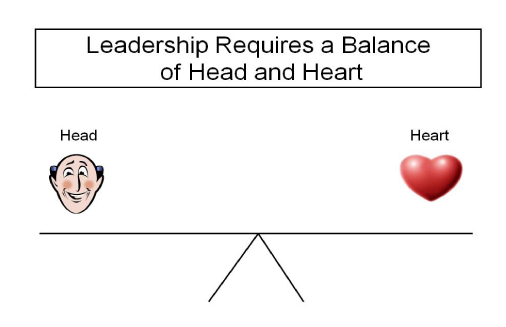I’m thinking of three leaders:
- One was a founder.
- One got fired.
- One failed.
Where do you think each was positioned on the balance beam above?
The founder was in the middle. He founded and led a highly successful corporation for many years. He had an excellent balance of heart for people and head for organizational life and business. He disciplined himself to think of ideas regularly to improve the lives of employees but is one of the smartest, shrewdest, business people that I know.
The persons who got fired were positioned on the left and closer to the head. They were nice people. But, they were not well-balanced. Under pressure, they went purely for the results and watched out more for themselves than for other people. They got fired. I’ve observed many that fit this category and ended with the same fate over time.
The person who failed was a leader in a non-profit organization. He led mostly with heart. He really cared about people but did not understand organizations, did not understand priorities, and did not stay focused on the mission. Because he could not stay focused and follow through on commitments and be held accountable, his organization imploded.
Blessing People in Practical Ways — Using your Head
In Good King/Bad King, we integrate biblical principles with practical actions that will make life better for you and the people in your sphere of influence. How are people blessed when leaders make sure these are in place and how are they hurt when they are not?
People are energized by clear purpose and vision. They get confused without it. People I led always wanted to know two key things: Why am I here? (Purpose), and where are we going? (Vision).
People are most productive in a job that fits their talents, passions, and “calling.” It’s a grind when they are “working against the grain.”
It sharpens the focus of the team if leaders make priorities clear. If priorities are constantly changing or are unclear, it causes stress and anxiety for people.
Leaders who empower their teams add to their sense of self-esteem, value and freedom. When leaders hold all the power, they diminish the self-worth, freedom, and, ultimately, productivity of the team.
Leaders benefit people through enabling progress. They do this through prayer, planning, leading change, providing training and documentation, implementing enabling control systems that guide and protect people, and finally by sharing meaningful measures so people know where they stand and how much progress they are making.
For more insight into head versus heart leadership, you may want to purchase Leon Drennan’s new book: Good King/Bad King, Which One Are You?



